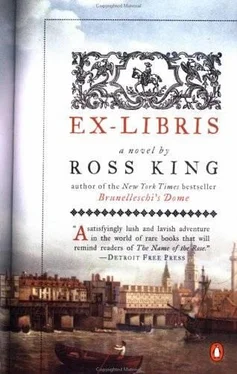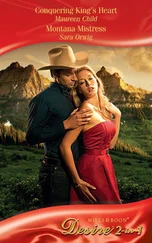I righted myself and staggered ankle-deep towards the counter, stumbling about in a full circle, unable to comprehend the compass of this destruction, let alone its purpose. I sank to my knees in the centre of the shop, only vaguely aware of Monk behind me. My precious refuge, my haven from the turmoil of the world-all of it was gone, destroyed. My chest began to heave like a child's. I remember a pair of hands on my shoulders but not whose they were or what happened next.
Indeed, of the next few hours I remember little: only a kind of dazed underwater progress through the shop, with Monk and I forlornly surveying the damage, picking up books and sorting through them, commiserating over the destruction of a volume or, more rarely, soberly celebrating the unlikely preservation of another. My walnut shelves, I discovered, had also been destroyed-ripped from the walls and flung to the floor, where they lay criss-crossed at rakish angles to one another and splintered like rigging after a tempest. Later I would decide that it must have taken an army to perform such desecrations, but only three men had done it, Monk told me, and it had probably taken them just five minutes. They took to their heels when, after hearing the noise, he crept down the turnpike stair and peered into the shop. They appeared to be looking for something, he said, because they had been snatching each book from the shelf, frantically riffling through it, then tossing it aside before moving on to the next one. But sometimes one of them would stick out an arm and sweep an entire shelf on to the floor, or else rip the shelf itself from its brackets, all without so much as looking at a single one of the books.
'Scared me good and proper,' he finished, eyes bright and nervous at the recollection, 'and I don't mind tellin' you.'
'Who do you suppose they were, Monk? The searchers?'
'The searchers, sir?'
It was close to midnight by this point. We were sitting at the counter, in our usual positions, master and apprentice, as if these familiar poses might bring back something of the shop's shattered equilibrium. Dozens of half-dismembered books still littered the floor, but we had managed to put up some of the shelves and replace the few of their books that would not require rebinding.
'The Secretary of State's henchmen,' I prompted him. 'You remember.'
He looked even more alarmed now. He knew a little about these myrmidons since two years earlier John Thurloe, the Secretary of State at the time, despatched them on their rounds of Little Britain and London Bridge. They paid us a visit only days after a pregnant woman had arrived in Nonsuch Books following what she said was an arduous journey by barge from Oxford. As Monk watched, frightened and incredulous, she gave birth on the counter to triplets-three copies of Sexby's Killing No Murder , a treatise calling for the death of Cromwell. The searchers had come pounding on the door two nights later. Poor Monk had been roused from his bed when a lantern was thrust in his face and a loud voice demanded that he identify himself. He had not forgotten the episode.
'No… not the searchers,' he replied. 'Foreigners.'
'Foreigners?'
'Yes. French. Maybe Turkish. Dark-skinned, they were, sir. The dead spit of pirates, all dressed in black. One of 'em had a gold earring. Another a knife,' he added soberly.
'Did they say anything?'
'Not a word.'
'Did they take anything with them? Any books?'
'No, sir.' He shook his head. 'Not so I saw.'
'No. Nothing seems to be missing, does it?' He shook his head again. So far all of the volumes seemed to be accounted for, though the next day I would double-check my catalogue. 'Which way did they go?'
'Into Southwark. I ran after them, but they was quicker 'n what I am.' He dropped his eyes to the counter. His hands were fidgeting in his lap.
'I understand. Thank you, Monk,' I told him. 'You did well.'
I leaned back in the chair, closing my eyes and trying to think. For a moment I almost allowed myself to believe the desecration had nothing to do with anything else that had happened these past few days. Or perhaps they had been searchers after all. Perhaps the new Secretary of State employed Frenchmen to do his dirty work. But what would they have been looking for? Possibly the new King was going to be as troublesome to booksellers as Cromwell. I decided that tomorrow I would put a few questions about in Little Britain and Paternoster Row. Someone else might have had visitors as well.
I opened my eyes to find Monk watching me closely. I tried to offer a reassuring smile. 'Yes, you did well,' I repeated. 'Very well. But I fear our work tonight is not yet finished.'
'Oh?'
I nodded at the door, which was slumped awkwardly on its hinges. The carriageway was visible beyond. Every few minutes a passer-by would peer curiously inside before quickly retracting his head and hurrying away.
'Tomorrow I shall find us a joiner and a locksmith,' I said. 'But for tonight…'
I reached into the counter and withdrew a pistol. Monk's eyes widened at the sight. It was an evil-looking weapon, heavy and awkward, a huge firelock I had purchased many years earlier from a blind, one-legged Civil War veteran who had taken to begging outside my shop. I had no idea if the flint and frizzen worked, or even how much priming powder to sprinkle into the pan. The old veteran had given me a lesson, but I had never expected to use the thing and had purchased it purely to relieve his misery.
'Tonight we shall take shifts guarding the shop,' I told him. 'Just in case someone should be tempted to avail himself of our stock.' I placed the dreadful instrument on the counter between us. 'Or in case our friends should wish to return.'
Monk's eyes grew even wider at these unpleasant prospects, so I attempted another reassuring smile, which came out as a pained grimace.
'Go to bed,' I told him gently. 'I shall wake you in two hours.'
But in the end I sat up the entire night by myself. I started the task of rebinding a few of the books, though every ten minutes I would leave my sewing-frame and creep to the door to peer on to the carriageway for signs of life, ears cocked to catch the sound of stealthy footsteps hurrying away. But there was no one about now except the watchman, an arthritic old fellow who hardly inspired confidence. He was half blind, I noticed. One of his eyes was filmed over like that of a dead fish, while the other rolled at me like that of the severed head as he advised me to repair my door in case I should offer a temptation too powerful for some poor soul to withstand. Then he shambled away with his lantern swinging.
Only after dawn broke in the east did I abandon my sewing-frame and wake Monk. And only as I trudged upstairs to bed did I allow myself to think about the three black-clad assassins who had murdered Lord Marchamont in Paris. Had they been the same men? It seemed possible-yet it made no sense. If the killers were agents of Henry Monboddo, as Alethea suspected, and if Monboddo now possessed the parchment, as I had discovered, then what could they have been searching for among my shelves? Possibly they were in the employ of someone else, even Cardinal Mazarin himself. I clambered into bed and tried to sleep. There were many things, I told myself, that I had yet to learn.
I lay on my side for several hours, exhausted but sleepless, staring at the wall, listening to the knocking of the death-watch beetles inside it. Suddenly the familiar sound was menacing and portentous, as if the insects were consuming the beams and supports of the modest life I had built for myself. As if Nonsuch House were about to collapse and tumble me head over heels into the current rushing past sixty feet below.
From the freshes of the Elbe at Cuxhaven the Bellerophon shaped a course westward along the Frisian Islands, past chains of snow-clad saltings and dykes, past sand-spits and moles projecting like ribs into the grey waters of the sea. She sailed in soundings, ten fathoms of water, for almost a full day until, setting a course southwest by south, she left the Dutch coast at dawn on the second day and, putting on more sail, holding a close wind, turned her bows towards England. Captain Quilter, peering through his spyglass, sighted the coast from the catwalk two hours later. All was going to plan. He lowered the glass and returned it to the pocket of his tarpaulin. In eight more hours, if all went well, they would reach the Nore and, riding at anchor, the Albatross .
Читать дальше












